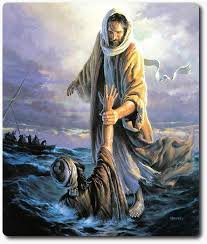21 Sunday A: Who do you say I am? The Messiah
Summary:
1. Who Do People Say He Is?
2. Who Do You Say He Is?1. Who Do People Say He Is?
3. What Are We Called to Do?
2. Recognition – Messiah: Title ; Sacrifice
3. Authority –Dependability – Rock
20 Sunday A - Liturgical Prayers
Greeting (See First Reading)
My house will be called
a house of prayer for all peoples,
says the Lord.
As the Lord welcomes us,
may we be open to all.
May the Lord, the Savior of all, be with you.
R/ And also with you.
My house will be called
a house of prayer for all peoples,
says the Lord.
As the Lord welcomes us,
may we be open to all.
May the Lord, the Savior of all, be with you.
R/ And also with you.
20 Sunday A: Jesus and the Canaanite Woman: Faith and Healing
Michel DeVerteuil
General Comments
This Sunday’s gospel passage is in two sections,
– an introduction in verse 21.
– the main story in verses 22-28
To get the significance of verse 21 we must look at the preceding passage which tells of the Pharisees’ continued hostility to Jesus. It was because he was rejected by the religious leaders then that Jesus decided to “leave that place” and “withdraw” to a foreign environment, “the region of Tyre and Sidon”, ending up experiencing a radically new dimension to his mission. So often an experience of rejection leads to new possibilities being opened up. Our “region of Tyre and Sidon” turns out to be a place of new beginnings.
– an introduction in verse 21.
– the main story in verses 22-28
To get the significance of verse 21 we must look at the preceding passage which tells of the Pharisees’ continued hostility to Jesus. It was because he was rejected by the religious leaders then that Jesus decided to “leave that place” and “withdraw” to a foreign environment, “the region of Tyre and Sidon”, ending up experiencing a radically new dimension to his mission. So often an experience of rejection leads to new possibilities being opened up. Our “region of Tyre and Sidon” turns out to be a place of new beginnings.
19 Sunday A: With Peter, Jesus in our Storms
 From Fr. Donald Planty:
From Fr. Donald Planty:The world’s attention is unfortunately, but understandably, regularly focused on the destructive force of natural events like hurricanes, tornadoes, earthquakes, and tsunamis, as well as on the violent human forces contending in conflicts in Central Europe, in the Middle East, in Africa, and in Latin America. In addition, we cannot help but be disturbed by so many forces intimately at odds with us: the aggression of temptation and sin, the debilitation of illness, the pain of emotional wounds, the intensity of the passions, and the assaults of demons. Indeed, the three enemies of our human nature–the world, the flesh, and the devil–are forces at war with us, striving to turn us away from Jesus and his saving Gospel. Yet, these negative forces are no match for the positive power–the Good News of Jesus. Yes, his grace, his presence with us, his provident love for us, is the greatest power in the universe–and no evil force can overcome him. That is the consoling message of the readings our Mother the Church offers for our meditation this Sunday: “Take courage, do not be afraid!” The power of God’s gentle mercy is greater than any opposing force.
We see this in the experience of the prophet Elijah: God’s presence is not revealed to him in the forceful wind, earthquake or fire, but in the power of his gently whispered word. In contrast to natural, worldly, damaging forces, God’s power is supernatural, otherworldly, life-giving, and so is manifested in tenderness, in calm, in peace. (more down below)
17 Sunday A: The Kingdom of God is like a ....
There is a price for relationship - Treasure Hidden
Rabindra Nath Tagore, the mystic poet of India, tells a memorable story from his own life which illustrates the truth of what Jesus teaches in today’s gospel, namely, that there is a price we have to pay in order to be in his kingdom, to keep a relationship with him. Tagor’s cook and housekeeper did not come to work on time one morning. Like so many professional men of his mind-set, Tagore was utterly helpless when it came to the routine details of the day, getting his clothes together, making his breakfast, tidying up his place. An hour went by, and Tagore was getting angrier by the minute. He thought of all kinds of punishment. Three hours later he no longer thought of punishment. He would discharge the man without any further consideration, get rid of him, turn him out. Finally the man showed up. It was mid-day. Without a word, the servant proceeded with his duties as though nothing had happened. He picked up Tagore’s clothes and set to making breakfast. Then he started cleaning. Tagore watched all of this with mounting rage. Finally he said, “Drop everything! Get out! I can’t stand the sight of you. You are dismissed…fired!” The man, however, continued sweeping, and after another, few minutes, with quiet dignity he said, “My little girl died last night.” (From Fr. Tony Kadavil's Collection)
Subscribe to:
Comments (Atom)